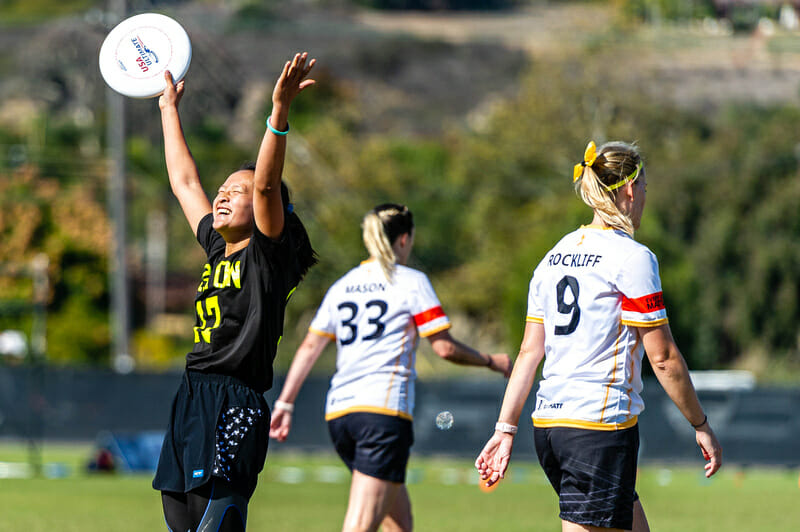Brute Squad shows they're still the team to beat!
October 23, 2021 by Graham Gerhart in Recap with 0 comments

Ultiworld’s 2021 coverage of the club women’s division is presented by Spin Ultimate; all opinions are those of the author(s). Find out how Spin can get you, and your team, looking your best this season.
SAN DIEGO – Friday’s last quarterfinal game was a test of the old vs. the new, the institution vs. the upstarts. In the end, though, the status quo was maintained as Boston Brute Squad took down Vancouver Traffic without much fanfare or pageantry. All the effort and energy in the world from Traffic couldn’t stop the seemingly inevitable outcome that Brute Squad was going to make their 7th national semifinal in a row. Traffic fought to the bitter end, but their relative inexperience shone through in a way that only Boston could expose resulting in a decisive 15-7 win for Boston.
Before their matchup against Boston, Traffic’s relative youth had been a powerful weapon in their arsenal. Yes, the team made mistakes, but they often had the tenacity and energy to get the disc back when it mattered most. The team had shown that their seeding was no mistake, and in pool play they matched Phoenix pound for pound with their offensive effort. It just wasn’t enough when playing a team like Brute Squad.
“The problem of Brute Squad is that they’re all amazing athletes, and they have all the throws,” said Traffic coach Matthew Doyle, “They don’t really have that weak link that you can target like other teams.”
This proved true in the early stages of the game between the two teams. Traffic was just a little bit too cavalier with their throws, leading to two early blocks from Boston’s Jessie Grignon Tomas and Cassie Wong, both of which resulted in breaks from the Brute Squad D-line. In a flash, Vancouver was in a 4-0 hole, down three breaks, and it was a deficit they would never return from.
That’s not to say that there weren’t bright spots in Traffic’s offense throughout the first half of their quarters game. While she attracted a lot of defensive attention, Catherine Menzie was still able to facilitate for the Traffic offense when she got an open lane to work in, and Daisy Lin was often able to find just enough wriggle room to be a safe reset when necessary to reestablish the structure of Traffic’s offense. It was just that at every turn, Brute Squad’s defense was turning what seemed like safe passes into 50/50 shots. “Our offense is really about isolating single players,” explained Doyle, “so when they’re able to recognize that and poach off that, it makes us more than a little stagnant.”
Stagnancy wasn’t really the issue for Traffic, though, it was just that they didn’t have any space in which to operate. The team did a great job of cycling through their positions on the field and running their system, it just wasn’t enough to get past a team that was prepared for everything that Traffic was ready to run. “Our strategy committee did a lot of scouting our opponents to get us ready for this game,” said Boston’s Rachel Kramer, “but it’s not just for today, we’re often prepared because we know how we’re going to play: tight defense and running our systems. We know how to do that against anyone, and there aren’t many teams that challenge what we run on defense.”
This was overly apparent in the first half, as Brute Squad efficiently built up an 8-3 lead, largely thanks to Kami Groom, Sophie Knowles, and Angela Zhu setting up Boston’s successful offense after the turn on their respective lines.
After resetting at half, Traffic came out with a fire under their feet, but it only extended to their offense. Yes, Laura Mason and Marie-Ève Beauchemin were able to get going on offense, but their defense still could not find an opening in Brute’s monstrous regiment of an offense. The teams traded holds for six points, with the score rising to 11-5 before the next break occurred. Unfortunately for Traffic, they were on the losing end of this break, too.
Boston’s overly stacked defensive line pulled the disc sharply to match the wind, setting Traffic back and forcing them to work desperately just to make it to half field. From then on, the two teams fought tooth and nail for yardage, with a number of turns on either side as neither team could close it out. Ultimate can’t end with a standstill, though, and eventually Groom found Leija Helling for the break, ending Traffic’s streak of successful holds.
After that marathon point, the game was effectively over.
Traffic did get a break of their own in the waning minutes of the game, and got a few more holds from the solid work of their cutters. A valiant effort, but Brute Squad ended the game with an around pass from Hannah Henkin to Erin Rea.
The difference in skill levels between the two teams was on full display during the game, but that’s not a criticism of Vancouver. Considering how much turnover they’ve had as a program, Traffic’s success of making it to quarters and playing as close as they did with Boston is to be commended. “We had a lot of turnover from 2018-2019, and then from 2019 to now,” said Doyle, “there are plenty of rookies with us who have never been to the tournament and now understand the level it takes just to be where we were.” If the pipeline remains strong in Vancouver, and the team continues to grow as they get more reps together, we’ll see them a lot more in the final days of bracket play at Nationals, and there’s always Worlds in the interim.